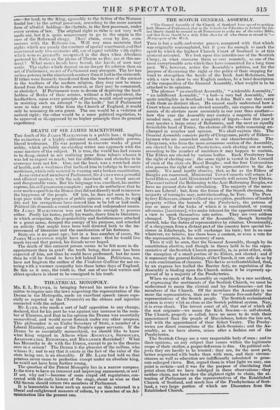THEATRICAL MONOPOLY.
MR. E. L. BULWER, in bringing forward his motion for a Com- mittee to inquire into the laws respecting the representation of the Drama in the Metropolis, made an excellent speech (more espe- cially as reported in the Chronicle) on the abuses and injustice connected with the subject. Mr. LAren, who made a sort of half opposition to any change, declared, that for his part he was against any increase in the num- ber of Theatres, and that in his opinion the Drama was essentially monarchical, and would never flourish under any other auspices. This philosopher is an Under Secretary of State, a member of a Liberal Ministry, and one of the People's upper servants. If the Drama be so essentially monarchical, we should like to know what King reigned in Athens when IESCHYLUS, SOPHOCLES, ARISTOPHANES, EURIPIDES, and MENANDER flourished ? What has Monarchy to do with the Drama, except to go to the theatre Once in a- season? The Drama is the pleasure of the million, who .witness it; and to say that it exists in the fact of the ruler of the state being one, is an absurdity. If Mr. LAMB had told us that potatoes never came to perfection except under an absolute king, he would not have been further wrong.
The question of the Patent Monopoly lieS in a narrow compass. IS the town to have an innocent and improving amusement, or not? If not, why not?—because of some stupid old regulations, con- nected with the early history of the stage, about as wise as that Old Sarum should return two members of Parliament.
It is lamentable to hear such an answer as this returned to a liberal and enlightened measure of reform, by a member of an Ad- ministration like the present one. . .


























 Previous page
Previous page